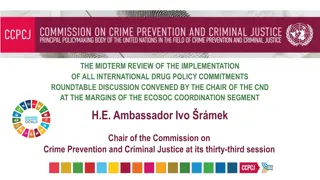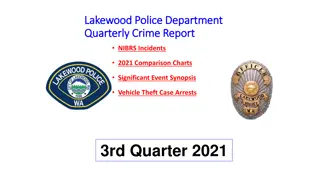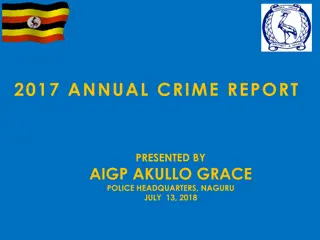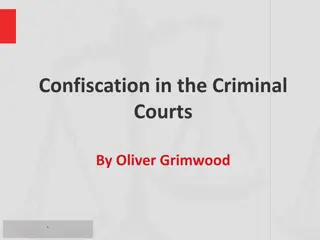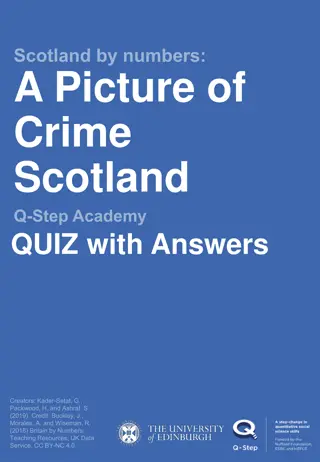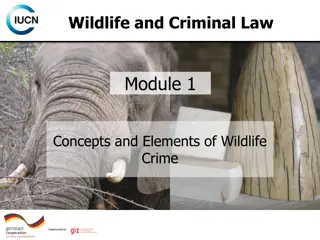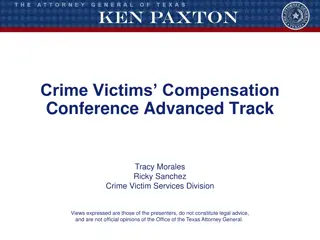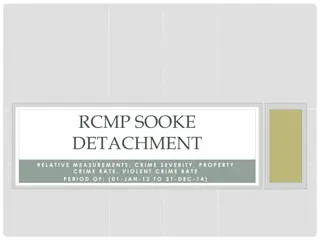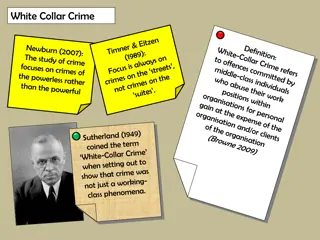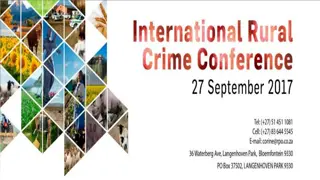Strengthening Measures Against Financial Crimes: The Proceeds of Crime Act 2018
The Proceeds of Crime Act 2018 aims to enhance efforts in recovering proceeds of crime and combating various risks such as money laundering, terrorism financing, corruption, and human trafficking. The act introduces measures like civil forfeiture, unexplained wealth powers, investigative orders, and more. It establishes bodies like the Ministerial Council and the National Identified Risk Framework Coordinator to identify and address risks associated with financial crimes.
Download Presentation

Please find below an Image/Link to download the presentation.
The content on the website is provided AS IS for your information and personal use only. It may not be sold, licensed, or shared on other websites without obtaining consent from the author.If you encounter any issues during the download, it is possible that the publisher has removed the file from their server.
You are allowed to download the files provided on this website for personal or commercial use, subject to the condition that they are used lawfully. All files are the property of their respective owners.
The content on the website is provided AS IS for your information and personal use only. It may not be sold, licensed, or shared on other websites without obtaining consent from the author.
E N D
Presentation Transcript
THE PROCEEDS OF CRIME ACT, 2018 An Act to Strengthen Measures to recover the proceeds and instrumentalities of crime and to combat identified risks
Objectives - s. 3 Prevent and investigate money laundering, terrorism financing, terrorism, corruption, proliferation of WMDs, and human trafficking Civil forfeiture of the proceeds of crime including cash Introduce powers related to unexplained wealth, investigative orders, a confiscated assets fund and a confiscated assets committee
Ministerial Council - s. 4 Members - Attorney General, Minister of Finance, minister of Financial Services, Minister of Foreign Affairs, Minister of National Security, National Identified Risk Framework Coordinator Function - Identify risk areas, assess and identify areas to minimise or eliminate risk
National Identified Risk Framework Coordinator (NIRFC) - s. 5 Chairing meetings of the Identified Risk Steering Committee Liasing with regulators and reviewing their compliance with the IRF Public training on risk matters Attending technical meetings of CFATF and the FATF Preparing reports of the IRF Steering Committee
Identified Risk Framework Steering Committee - s. 6 NIRFC and representatives from the following agencies Attorney General Director of Public Prosecutions Financial Intelligence Unit Customs Department Police Force Defence Force Immigration Ministry of Foreign affairs Ministry of Finance Financial services Central Bank of The Bahamas, Any other financial services regulatory entity appointed by the Attorney General Any
Functions of IRFSC Conduct a risk assessment periodically Stay aware of FATF country pronouncements and inform financial institutions of their obligations Develop and implement policies to mitigate identified risks Collect statistics Report to the Ministerial Council Provide information to financial institutions, regulatory bodies and professional associations Consult with relevant institution and bodies
Money Laundering s. 8 Does not require a conviction to show that the property in question is directly or indirectly the proceeds of crime Knowledge, suspicion or intent can arise from objective factual circumstances
Money Laundering Requirements - s. 9 Must have knowledge or reasonable suspicion This includes concealing, disguising, converting, transferring or removing the proceeds of crime from The Bahamas Concealing can occur by disguising the nature, source, location, disposition, movement, ownership or rights to property
Definition of Money Laundering - s. 11 Committed when a person knows or suspects or should reasonably have known or suspected that he is acquiring, used or possessed the proceeds of crime A significant clue is when someone pays considerably less than market value for an item
Duty to Disclose - s. 12 Accountants, attorneys and notaries, must disclose to the Focal Point Officer, as soon as possible after they have any reasonable suspicion of money laundering that comes to them during the course of their business No offence is committed if there is a reasonable excuse for not disclosing The Nominated Officer is the person nominated by the person s employer to receive disclosures
Failure to Disclose by Nominated Officers - s. 13 A Nominated Officer commits an offence if he knows or suspects that someone is committing money laundering and he does not disclose it to the Focal Point Officer as soon as possible after he has this information
Tipping Off - s. 14 An offence is committed by anyone who lets someone know that the Financial Intelligence Unit has been them under suspicion or has an ongoing investigation re money laundering
Penalties - s. 15 Sections 9-11 Summary Conviction Up to 7 years, up to $5,000, both Indictment Up to 20 years, fine, both Sections 12- 14 Summary Up to 12 years, up to $5,000, both Indictment Up to 20 years, fine, both
Defences and Consent - ss. 16 -17 No offence if disclosure is authorised under section 19 with consent from a Focal Point Officer Consent occurs where there has been disclosure to a Focal Point Officer and after 7 days the FPO has not refused consent, or after a 31 day moratorium period has ended the FPO has not given a final refusal
Protected Disclosures - s. 18 No breach re disclosure of information if information came to the discloser during the course of their business, the discloser reasonably knows or suspects money laundering, disclosure is made to Focal Point Officer or Nominated Officer as soon as possible
Authorized Disclosures - S. 19 A disclosure is authorised if it is made to a FPO or NO, if made of own free will and made in the proper form
Conviction Based Confiscation - s. 22 Conviction must be for offence that happened after the Act came into force but benefits received from pre-Act criminal conduct can be taken into account when determining an extended benefit Standard of Proof- balance of probabilities
Application for a Restraint Order - S. 23 Can apply for restraint order when person a. Under investigation, b. Charged, or c. Convicted. The enforcement authority may apply for an order relating to the proceeds of the offence, the instrumentalities of the offence, property in which the person has an interest An application to restrain the property can be made, ex parte, or in camera to a Supreme Court Judge The application should be in writing and supported by affidavit setting out the reasons for the belief that the property is the proceeds of crime and that the person under investigation has an interest in the property
Restraint Order - ss. 24 - 25 The Court can make an Order even where the person has not been convicted of an offence that A. he committed an offence, AND is under an investigation or has been charged B. He has an interest in the property and the property can be subject to an application C. That the property cannot be disposed of, that it can be seized, or a receiver can manage it A receiver has very wide powers in dealing with the subject property, including to sell it but the Court can make orders to guide the receiver Within 2 days after a restraint order is made the enforcement authority should give notice to affected persons
International Requests - s. 26 A foreign jurisdiction can make requests to the Bahamas for the restraint or confiscation of property that is the proceeds of crime or for relevant information and the enforcement authority in The Bahamas can make the same requests of Foreign jurisdictions
Further Orders - S. 27 The Court can vary orders at any time including for the relevant person s living expenses to be paid A relevant person must set out a statement to support why the Court should allow his reasonable living expenses to be paid and this statement must be made even if it incriminates him or exposes him to a further civil confiscation order or penalty The statement is inadmissible in criminal proceedings except as evidence of its falsity
Third Party Interest in Property - s. 28 Person who has an interest in property can make an application for the court to exclude that property from the restraint order Must prove, inter alia, that the property is not the proceeds of crime or that the property was acquired prior to the Commission of an offence etc.
Penalties for Breach of Restraint Order- s. 29 Contravening a restraint order is a fine, up to 25 years imprisonment, or both Where a restrained property is sold for less than market value or the purchase was not made in good faith, the Court can set aside the sale
SEIZURE ORDERS - s. 30 On application by an authorised officer the court may make an order for the enforcement authority to search and seize property, including to enter by force, and seize any items which may serve as evidence or which may likely have been subject to a restraint order
Liability of Receiver - S. 31 Receiver liable only for loss from negligent or reckless misconduct
Restraint orders made when a person is under investigation should be discharged, upon application, in 3 years unless the person is discharged
Confiscation and Benefit Orders - s. 33 Applies where a person has been convicted Application made by the enforcement authority to the convicting court for a confiscation, benefit recovery, or an extended benefit recovery within 6 months after the conviction A conviction includes not guilty by reason of insanity and plea deals
What Counts as a Conviction? - s. 34 If warrant for arrest is issued but person evades arrest for 6 months The person charged with an offence for which there was sufficient evidence to support a conviction died before a trial was finished Cannot make application for extended benefit order under these circumstances
Service of Application and Appearances - s. 35 Application by enforcement authority should be by affidavit and served on all parties that may have an interest in the property Parties with an interest in the property can appear and give evidence Unlike the criminal law that frowns upon trying defendants in absentia, the Court can still make an order even if the person absconds
Confiscation Order on Conviction A confiscation order is in rem (as against the whole world or against the specific property) If satisfied that the property is the proceeds of crime, terrorist property, or used to commit a crime the Court can make a confiscation order The Court has wide freedom to infer that property is the proceeds of crime , etc. but will also consider the rights of third parties including the public interest in confiscating proceeds of crime Where property is no longer available for confiscation the court can make an order for the monetary equivalent The enforcement authority can request assistance in a foreign jurisdiction to enforce order (s. 38)
Effect of Confiscation Order - s. 39 Property vests in the Treasurer of The Bahamas Confiscated property cannot be disposed off before an appeal is completed
Exclusion of Property from Confiscation Order - s. 40 A third party who has interests in a confiscated property can apply to the Court to have his interests excluded An application must be made within three months after confiscation order A person who had notice of the confiscation application is ineligible to apply to have the property excluded from the confiscation order
Benefit recovery order - s. 41-42 This differs from a confiscation order in that it is directed towards a particular person to pay an amount equal to the benefit he derived from criminal activity A benefits recovery order cannot be enforced before an appeal is complete Where the enforcement authority applies for a benefit recovery order it must set out a summary of the value of the benefit it believes a relevant person has receive The relevant person must respond to all allegations or be taken to have accepted them as true A benefit may include any money received by the relevant person, any money received by someone else at the request of the relevant person, for any service or financial advantage
Extended benefit recovery orders - s. 43 This is also against the person, but extends beyond the actual benefit that he received This is only available 1. if the person has been convicted of an offence that carries a prison term (check with boss as this seems a bit unusual also there is no and/or behind the; so it is difficult to know whether this is in the alternative) 2. The offence on which the application is based is the third such offence or the person has been convicted three times for the same offence in 10 years The Court can make any property that the person held up to 6 years before they committed the offence subject to an extended benefit recovery order
contd. The person can prove on a balance of probabilities that the property is not the proceeds of crime and that it was lawfully acquired Where the enforcement authority applies for an extended benefit recovery order it must set out a summary of the value of the benefit it believes a relevant person has received The relevant person must respond to all allegations or be taken to have accepted them as true
Conditions related to payment of benefit amount - s. 44 The order should specify the amount to be paid and it should be paid within six months If the amount is not paid on time it attracts interest at the same rate as civil judgements and a prison sentence is served in default and the money must still be paid A person can apply to court to reduce the amount of the order on the basis that their assets have been reduced - Application must be supported by affidavit. Where the court allows a reduction it will make the amount equal to all of the assets under the relevant persons control; the court can also increase the amount on the application of the enforcement authority providing information that the relevant persons assets have increased
Satisfaction of Order - An order is satisfied by payment of the amount due, or if the conviction or order is quashed
Appeals - s. 46 Any party dissatisfied with a decision of the court can appeal to the Court of Appeal and Privy Council
Realization of Property - s. 47 Where an order is a final order, the court can have a receiver take possession of the assets to realise their value
CIVIL ASSET FORFEITURE. s. 50 An order granted where the court finds on the balance of probabilities that property is the proceeds of crime, an instrumentality of criminal conduct, or terrorist property It is not necessary to show that the property is related to a specific criminal offence Assets from a crime which have been converted to another form can also be the subject of civil forfeiture, for example a house brought from money acquired from drug dealing could be subject of civil forfeiture The application of civil forfeiture is very broad because it can be in relation to property acquired before the Act came into force and even where the person who committed the crime is now dead The value of the property must be at least five thousand dollars
Property freezing orders- s. 52 The enforcement authority can apply to the court for a property freezing order to preserve the property that is suspected to be the proceeds of crime The application is made by affidavit, in a private hearing, and without giving the other party notice If the court makes a property freezing order,, any person with an interest in that property must be given notice of the order within seven days
Additional property freezing orders - S. 52 The court can make further orders in relation to a property freezing order The court can order that property be seized, taken into possession, delivered up for safekeeping, a lien on the property, appoint a receiver A receiver can insure the property, sell the property if it is perishable and without the court's approval if the persons who owned the property consent to the sale, if not selling would cause loss in value or if it would cost more to obtain the court s approval than the property is worth If the property is a business the receiver can hire and fire employees, operate the business based on acceptable practices, or sell or liquidate the business The court may exclude from the freezing order reasonable legal and living expenses of the property owner if it is satisfied that the person does not have any other property sufficient to cover those expenses The court can always vary or revoke a property freezing order on the application of the property owner or the enforcement authority
Property Seizure Orders - -s. 53 The property seizure order allows an authorised person to search for and seize property if it is likely that the property will be sold or spent During the search, can seize other property of a similar kind but must notify the court within 24 hours and leave a record of the seized property with the occupier of the premises
Granting of civil forfeiture orders - s. 54 The enforcement authority may apply to the court and shall serve a copy of the application on any person who may have an interest in the property An interested party can enter an appearance and give evidence The court can grant a civil forfeiture order if satisfied on a balance of probabilities that the property is the proceeds of crime The property might be vested in a representative of the enforcement authority or in a receiver
Protection of legitimate owners - s. 55 The court can make orders to protect persons such as the rightful owners of the property who was deprived of it by criminal conduct, or who purchased the property in good faith for market value
Appeals - s. 57 Can be made to the Court of Appeal by interested parties or by the enforcement authority
Realisation of Forfeited property - s.58 The enforcement authority can sell, destroy or otherwise deal with the property in any manner Duty to sell property for the highest amount Reasonable expenditure incurred in selling the property can be recovered by the enforcement authority
Compensation of property owner - s. 59 If a property was frozen but no civil forfeiture order follows, the property owner can apply to the court for compensation An application for compensation must be made within 3 months after all appeals are exhausted A receiver is not personally liable for any loss unless he is negligent, reckless, or guilty of intentional misconduct
Sharing of information - ss. 60-61 Enforcement authority can make request from foreign authorities for information The enforcement authority can obtain information from the Financial Intelligence Unit, Compliance Commission, Securities Commission, Central Bank of the Bahamas, and the Gaming Board The enforcement authority can disclose information in proceedings for civil forfeiture, criminal investigations, and criminal proceedings
Cash and personal property forfeiture - s. 63 Allows for the forfeiture of cash or personal property which was gained through unlawful conduct or which is intended to be used in unlawful conduct Does not require criminal proceedings to have been brought in relation to the cash or personal property
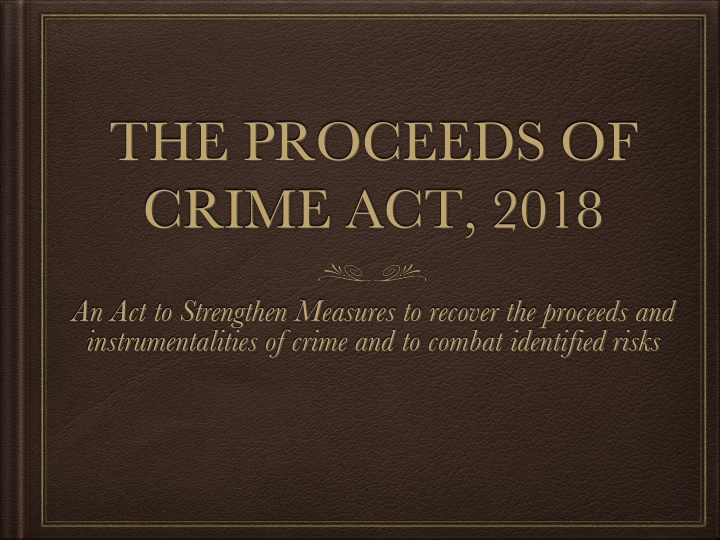

![Prevention and Combating of Hate Crimes and Hate Speech Bill [B.9B.2018]](/thumb/60513/prevention-and-combating-of-hate-crimes-and-hate-speech-bill-b-9b-2018.jpg)


